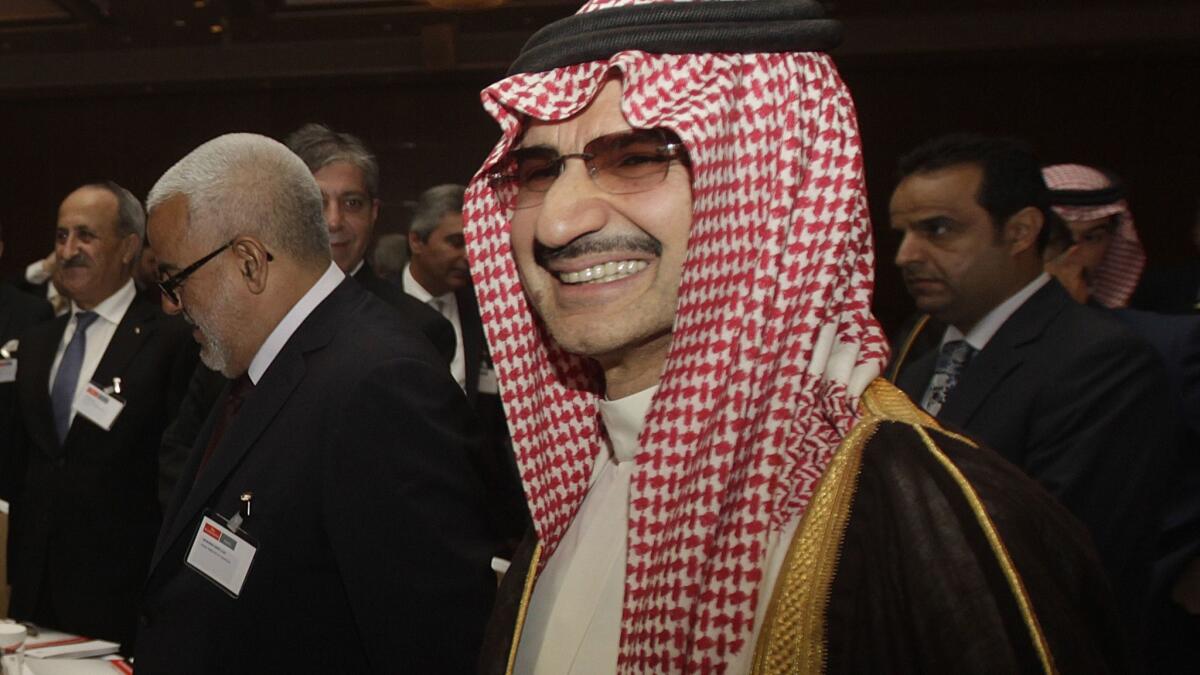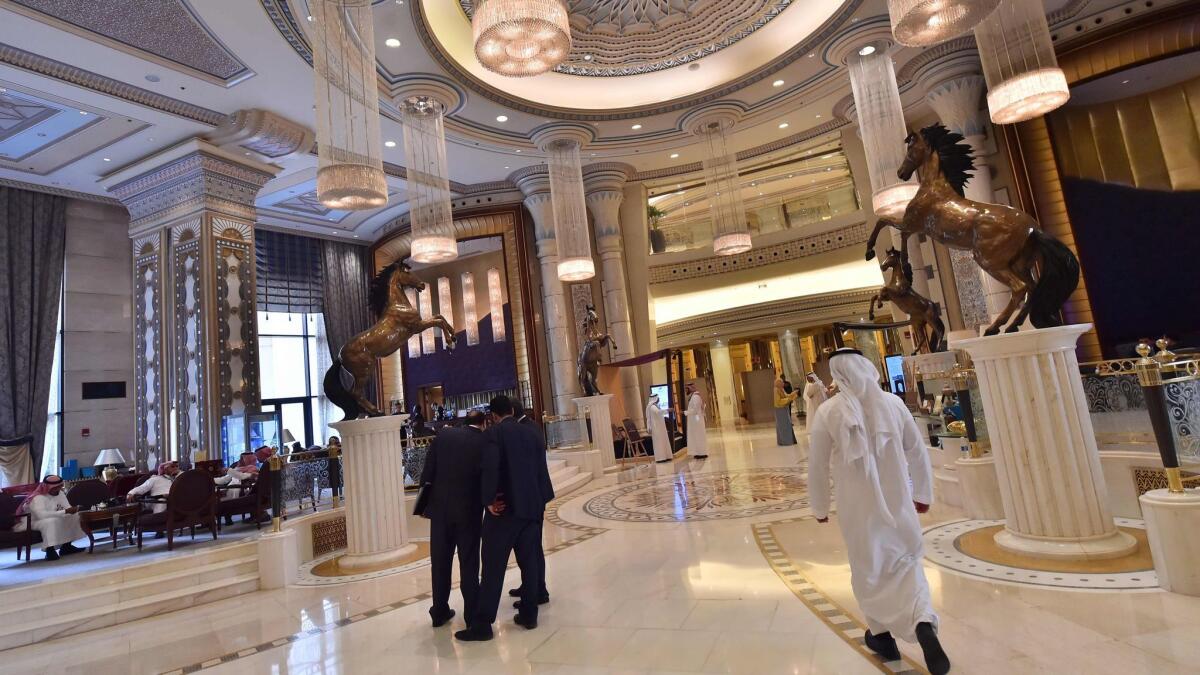Saudi squeeze on Prince Alwaleed has more at stake than money

Almost two months into it, Saudi Arabiaâs crackdown on corruption is yielding at least some of the $100 billion the kingdom is targeting. Dozens of former officials and businessmen have exchanged part of their wealth for freedom.
But in the increasingly drawn-out case of Prince Alwaleed bin Talal, the public face of the Saudi royal family to many foreign executives and investors, thereâs more at stake than taking over his global business empire and talks on a settlement have hit an impasse.
The Saudi crown prince, Mohammed bin Salman, is about to enter a crucial few months that will show his true motives and the scope of his power.
How the case unfolds will help investors and diplomats answer a question puzzling them since the nightly raids of Nov. 4: Whether the purge is an effort to root out graft before selling shares in the countryâs oil giant, or simply a shakedown to boost state coffers while he asserts himself at home and abroad.
People with knowledge of the matter say Alwaleed is balking at demands that could see him relinquish control of Kingdom Holding Co. He also is resisting any suggestion of wrongdoing because of the impact it would have on his reputation, they said. The prince owns the vast majority of the $9-billion conglomerate, which has stakes in household names from Citigroup Inc. to Twitter.
âThe Alwaleed case will define the crackdown to western investors,â said Emily Hawthorne, Middle East and North Africa analyst at Texas-based advisory firm Stratfor. The longer Alwaleed remains behind closed doors, the more the government âappears the unreasonable actor,â she said.
The crushing of opponents fits into a pattern of what Arab and Western diplomats describe as an aggressive policy that is unsettling even some of Saudi Arabiaâs allies.
Prince Mohammedâs supporters say he has no option other than to move fast and act decisively to end the economyâs unsustainable oil addiction and prevent Shiite-ruled Iran from dominating the Middle East.

Alwaleed and other remaining suspects are held at the Ritz-Carlton in Riyadh, a palatial hotel that hosted U.S. President Trump in May. No official charges have been made public against any of the detainees, who numbered 159 at a count earlier this month.
The 62-year-old nephew of King Salman, who attended Menlo College in Atherton, Calif., used his royal wealth to invest in industries from banking to aviation, hospitality and real estate. The Wall Street Journal reported this month that authorities are demanding at least $6 billion to settle his case. His net worth has declined by about $2 billion to $18 billion since his detention, according to data compiled by Bloomberg.
Prince Miteb, son of the late King Abdullah and the former head of the powerful National Guard Corps, was released after paying the equivalent of more than $1 billion, a senior Saudi official said last month. Two other sons of the former monarch were released this week, according to a person familiar with the matter and a Saudi royal who celebrated their freedom on social media.
âPrince Alwaleed is powerful and well connected, but this may not end well given that he is in a battle with an even more powerful group,â said Paul Sullivan, a Middle East specialist at Georgetown University in Washington, D.C. The purge is âa harsh way to show that some of the old ways of doing business are over to a great degree.â
Kingdom Holding said in a Nov. 6 statement it had the full confidence of the Saudi government. Officials at the company didnât respond to a request for further comment when contacted by email. The governmentâs Center for International Communication said it canât comment due to Saudi laws protecting an individualâs right to privacy.
The 32-year-old crown prince ditched the traditional Saudi decision-making process that moved at a glacial pace, but preserved consensus among the royals. His domestic efforts have been more successful than his foreign ones.
He plunged Saudi Arabia into a costly war against pro-Iranian rebels in Yemen and led efforts to isolate neighboring Qatar. While pro-Saudi forces are gradually gaining ground in Yemen, rebel missiles have reached Riyadh twice in the past two months. The standoff with Qatar has gone nowhere.
The kingdom was also widely blamed for orchestrating the shock resignation of Lebanese Prime Minister Saad Hariri from Riyadh in November, a claim that Saudi officials denied. It sparked outrage in Lebanon, a chilly reaction from Egypt and the U.S., and a French intervention that helped Hariri remain in office.
At home, the prince, known among journalists and diplomats as MBS, cemented his power by sidelining senior princes. Security forces rounded up government critics before a decision to lift a ban on women driving in September. He is also spearheading an ambitious plan to overhaul an economy too reliant on petrodollars, with the sale of a small stake in monopoly oil producer Saudi Aramco in 2018 underpinning it.
âWe have reason to be more optimistic about his domestic projects than his foreign ones,â Hawthorne said. âHe has carefully consolidated power domestically whereas each of his foreign forays have so far mostly struck out.â
The corruption probe had to take place without delay so investors âknow itâs a level playing field,â Commerce and Investment Minister Majid Al-Qasabi said in an interview on Dec. 13 in Riyadh. âWe canât tolerate the perception that you have to corrupt officials to get into a business in Saudi Arabia,â he said. Asked about Alwaleed, the minister said the billionaire prince was ânegotiating his settlement.â
For decades, prominent businessmen benefited from close ties with royal princes to win major contracts and help international companies gain a foothold in the country.
In a secret 1996 cable published by WikiLeaks, a U.S. diplomat in Riyadh reported that a handful of the most senior princes enriched themselves by skimming from âoff-budgetâ programs that received 12.5% of the countryâs oil revenues. The diplomat said some royals used their power to confiscate land and resell it at a profit to the government.
âSaudi Arabia has an economic and political system based on the privileged position of the royal family,â said Paul Pillar, a former CIA officer who is now an academic. âMBSâ moves have taken a form that can best be described as a shakedown. And, of course, his political ambition and what appears to be a drive for absolute power cannot be separated from any of this.â
Shahine and Carey write for Bloomberg.
@alaashahine
@gccarey1
More to Read
Inside the business of entertainment
The Wide Shot brings you news, analysis and insights on everything from streaming wars to production â and what it all means for the future.
You may occasionally receive promotional content from the Los Angeles Times.










